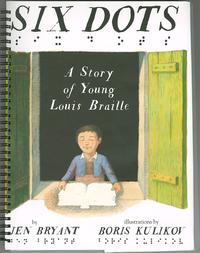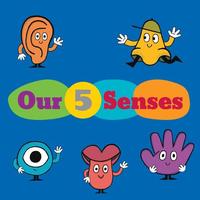Our Five Senses, a new exhibition in Parkway Central Library's Dietrich Gallery opened earlier this year, and we had the honor of sitting down with some of the authors and illustrators who appear in the show. This month, we discuss the biography Six Dots: A Story of Young Louis Braille with its author, Jennifer Bryant.
Jen, we’re delighted to chat with you again about your work and your inspirations, ESPECIALLY because Six Dots is such a powerful story. What attracted you to the history of Louis Braille?
When I was twenty years old, I did some reading for a blind college student, an experience that made me realize how much I took for granted as a fully sighted person. I was majoring in French at the time and was able to visit Coupvray, when I travelled to France that summer. About a dozen years later, I was asked to write a young adult biography of Louis Braille for a Chelsea House series entitled Great Achievers: Lives of the Physically Challenged. The research I did for that book piqued my interest in Braille’s life and in the origins of his six-dot code. I vowed that I would revisit the story for even younger readers, but in a much more intimate, personal way than the YA series book had allowed.
The copy of the book on display is very special to us because it’s a copy you donated on your last visit. This version uses transparent pages to superimpose Braille over the written text and pictures, which allows sighted people and people who are blind or have visual impairments to read it together. The book received the Schneider Family Book Award for its inclusivity. Tell us about winning the award.
First, let me thank you again for inviting me to visit the Free Library and to share my work with students from nearby schools. That is always such a delight and a privilege! Second, I’m thrilled that you are incorporating the print-braille version of Six Dots into your current exhibition. There’s nothing like the experience of holding one of those special-edition copies in your hand and having Louis’s six dot code super-imposed over the regular print version. Many people don’t know that the National Braille Press makes this kind of book available for young people and that they try to produce a number of popular kid’s books titles in this dual format each year. And third—the Schneider Award! It was such a thrill to receive this award on-stage at the American Library Association's Youth Media Awards in 2017 with illustrator Boris Kulikov. We had not met each other until then, which is a fact that surprises many folks (authors and illustrators are usually paired up by the publisher and we usually work separately.) The sponsor of this award, Katherine Schneider, is a retired Psychology Professor who is also visually impaired, so this book had particular resonance for her. Any recognition from ALA is always a huge blessing for an author/ illustrator and having a Schneider Award sticker on Six Dots (and earlier on A Splash of Red: The life and Art of Horace Pippin, illustrated by Melissa Sweet) is something I’m particularly proud of.
As a sighted person writing about Louis Braille, what kind of research did you do to capture his life? As someone who writes for a variety of age levels, does this research vary depending on your audience?
That’s a great question, and it was THE biggest challenge of writing Six Dots: How do I get sighted readers to imagine (as much as they can) the emotional journey that Louis Braille travelled? In general, the research doesn’t vary all that much for the different age groups—I do as much research for a 100+ page young-adult book as I do for a 32-page picture book. The reader may notice more of that research in the longer book, but even in the shorter one, the deep research is always there somehow, informing the book and also sometimes incorporated into the back matter or even into the illustrations. (With Six Dots, I also made the somewhat unusual decision to tell the story in first person, a technique that serves to bring the reader closer to Louis’s emotions.) I read books, journals, and websites in both English and French; I located and photographed examples of braille that were all around me in public spaces such as schools, hotels, restaurants, libraries, community centers, and universities; I interviewed visually impaired adults, students, and educators; I interviewed physicians; I watched films and visited braille libraries. All of this informed the book, as well as my own deeper understanding of how significant (and brilliant!) Louis’s invention of the six-dot system really IS.
Every author (and student) with an interest in writing about a historical period should commit that advice to memory. As an author, you’ve tackled nonfiction, like with Louis Braille, but you've also written fiction and poetry. Does your preparation for a book change depending on the topic or genre?
All of my writing, regardless of genre, combines curiosity, passion, and research. Even my poems usually have some "research" aspect, even if it’s making observational notes about nature, or a soccer game, or an art exhibition. My novels in verse also required a lot of research into topics as diverse as the war in Vietnam, rock ‘n' roll lyrics, pirate life, kidnapping laws, the history of newspapers, aviation history, the teaching of evolution and so on. I LOVE that part though (this is where the passion comes in.) It’s like setting off on a journey with an empty suitcase and before I know it, it is so FULL of interesting things that I am so eager to share!
What’s the next topic you want to explore?
I’ve been very busy since I wrote Six Dots. . . I have a new biography coming out in Fall 2019 and you can read about it on my website. Then there will be another new biography published Spring of 2020, and I’ve just begun the research for another book for 2022, so stay tuned!
Jen, you're so busy! Thank you for taking the time to sit down and chat with us about Six Dots.
Many thanks! Always a pleasure to chat with the Free Library.
Our Five Senses is open now through November 2, Monday – Saturday, 9:00 a.m. – 5:00 p.m. For more information, please visit www.freelibrary.org/fivesenses.
Support for this exhibition has been generously provided by Independence Foundation and PNC. The Free Library of Philadelphia gratefully acknowledges additional contributions from individuals.
Have a question for Free Library staff? Please submit it to our Ask a Librarian page and receive a response within two business days.



